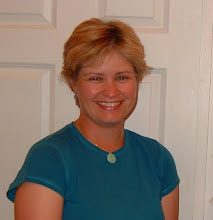I have recently been introduced to an excellent web-site called www.ted.com. It comprises a selection of talks by speakers of all disciplines, on all topics, and its strap line is "ideas worth spreading". I am a new visitor to TED - my attention was drawn to it through the newsletter of a fellow coach named Mary Rosendale, and then just the other day my friends Jane and Gary Spinks told me about a talk given by Sir Ken Robinson. (Thanks guys!xx)
If you are interested in children, in education, in creativity, or if you've simply got 20 minutes to spare to listen to something entertaining, then do take the time to check out the video! I tried to include a link to it in my blog but technology got in the way. Blogger wouldn't let me do it, so I have to trust that you will go and find it for yourself then come back here and read what other things I've got to say on my soapbox, and hopefully leave some comments, which I might even publish. So go to the TED web-site, search on Sir Ken Robinson, then sit back and relax for 20 minutes, and come back later!
Meanwhile, by way of an interval, here's a nice photo of some barbies on the beach:

WELCOME BACK! What did you think?
Sir Ken talks a little bit about learning disorders and ADHD. What he says strikes some as rather controversial, however I do agree with him that prescribing medication to children who are simply different, who have different needs, and who do not conform to the narrow strictures of a modern classroom, is tragically misguided, insensitive and unimaginative. These young people are far more likely to be the creative, innovative geniuses of the future than many of the "conformers", and yet we typically do not know how to deal with them.
I once saw a TV programme about ADHD and in it the mother of a young lad who was awaiting diagnosis actually said that she found her son's behaviour so difficult that she didn't know how to love him.
For me, this is precisely where the problem lies: it is our (innocent) ignorance and (innocent) lack of imagination, compassion and wisdom which causes us to get impatient with the behaviour of others. We withdraw from what we don't understand or feel comfortable with. When the object from which we are withdrawing is another human being, in fact a lonely, confused and highly sensitive CHILD, we cannot begin to know the impact of our action on that individual. When the person doing the withdrawing is the child's own mother, then the impact is magnified a thousand fold.
Actually the woman being interviewed was extremely brave to admit her feelings about her son. She didn't WANT to withdraw from him - she just didn't know what else to do. She was doing the best she could do, and she was becoming exhausted and desperate.
It IS exhausting always to be looking for something different from what we're faced with. It is exhausting always to be thinking, "I didn't want things to be this way, I wish they could be another way."
Why not just stop, take another look at what we do have, what's in front of us RIGHT NOW, what the beautiful best of it is, and work with that? It does require us to be extremely tuned in to what's going on with those around us, we need to be connected, we need to be open, we need to drop our expectations and our judgements about how things ought to be, and we need to listen and respond.
Four years ago I had a great teacher named Dr Roger Mills. I learned many things from him, and one of those things was that bad behaviour comes from insecurity. If you want a child to behave badly, withdraw from them. Show them no interest, no love. This sounds very harsh, and of course it is something that every single one of us as parents would say that we couldn't possibly do. In our own way we all believe wholeheartedly that we love our children and that we show them we love them. The trouble is, it is love by our own definition.
Instead of loving our children to the standards by which we were loved, by the confines of our own conditioning, we need to pay special and careful attention to how our children want us to love them. For my son, he wants me to speak to him honestly, without sarcasm, and to trust him. My daughter needs more interaction, she likes to play imaginative games, and she likes me to join in.
How we love our children, how they like to feel our love, is not dissimilar from how we educate our children. As they have different sensitivities so they have different intelligences.
What faces us now is how to use more of our own wisdom and creativity in designing education that will prepare our children best for the uncertainties of the future.
One thing I'm sure of is that this will be much easier if we stop trying to control and becalm everything and everyone that threatens to rock the boat. Withdrawal, exclusion and medication are cruel, inhumane and entirely unsustainable foundations for human civilisation, and yet these seem to characterise the experience of too many children.
Love, compassion, flexibility, openness and an ability to empathise and connect with others are the only ways to safeguard our children's future. Once we've got these things right, education, creativity and how to accommodate "non-conformers" will take care of themselves.


No comments:
Post a Comment